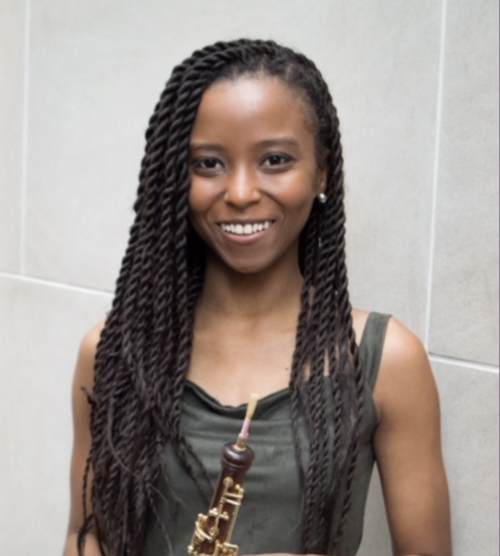Jasmine Daquin
Oboist Jasmine Daquin ‘19E (MM) has a busy career as a free-lance oboist in New York City. She recently added another achievement to her resume, as the founder of Black Classical Music Educators, an online space for parents of young musicians, and adult students, to easily secure private lessons with a Black classical music educator. It is also a community for Black classical music educators to find and professionally engage with each other. BCME had a successful launch on July 19. In an Eastman Journal interview, Jasmine described the immediate success of this new venture, and how she hopes it will help and inspire the Black community.
It sounds like you had a great reaction to your BCME site after the July launch! Can you give an update on your progress?
There are currently 36 educators listed on the site. There’s a lot of traffic on the website already, with about 3,000 visits in the first month. BCME is meant for parents and students to get in contact with educators directly, so there are no sign-ups, but there have already been BCME lessons taught, which I’m very happy about!
How exactly did the site begin and how did you develop the idea? Was this before the COVID-19 pandemic?
There are certain events that took place in my life that influenced my idea for BCME; however, the idea came pretty quickly and not too long ago.
It was a few months after the COVID-19 pandemic led to shutdowns, and shortly after protests began due to police brutality towards Black people. These led to conversations about racism in every facet of society, including classical music. That’s when I began thinking more about representation in classical music, and how important it is. Whenever I taught Black students, their parents were so happy to have their child taught by someone who looks like them and has a lot of common experiences with them. Similarly, many wonderful audience members have come up to me and said I inspired them to continue learning an instrument or have their child start one. I wanted people to find representation easily, and that’s why I founded BCME.
How did you get other musicians interested in taking part?
BCME isn’t a music academy where I take a percentage of educators’ lesson fees. There’s nothing wrong with those, it’s just a different model, and those types of businesses are necessary. BCME, rather, is one place, online, where Black educators can be highlighted and students can find representation and great instruction. There is no competition either. As long as the educator has a bachelor’s degree or equivalent experience in music, they are eligible; most of the people listed have masters and doctorate degrees. People sense that our main goal is to serve educators and students, and this really draws musicians in.
What aspects of your education at Eastman have helped you in creating and sustaining this site?
My time at Eastman thoroughly prepared me for balancing administrative work with performing. In my final semester, I was preparing for my master’s recital, final exams, and doing a whole case study for a music leadership course. I had no idea that I would be applying my knowledge from music leadership courses to my life so soon.
What I really appreciate was that at Eastman, no type of music career was favored over another. Other career possibilities, such as music education and music administration, are valued just as much as music performance. This is not the case at every school. If it weren’t for that, I probably wouldn’t be so confident that I could pursue whatever is important to me. Right now, that’s performing and BCME.
Are any of your other teachers Eastman alumni?
Yes! Five other educators: Peyton Johnson (trumpet), Veena Akama-Makia (voice), Katie Brown (viola), Adam Sadberry (flute), and Richard Desinord (music theory). Another, Armand V. Hall II (conducting, clarinet) is currently an adjunct professor at Eastman and Executive & Artistic Director of the ROCmusic Collaborative. They were among the first educators on the site.
What are your plans for the future of the site? You mention partner businesses and a listing of performance opportunities.
I’ve partnered with MOO, a printing business, to offer our educators credit towards products such as business cards or planners. I’ve also partnered with Smither-Lewellen Studios [designers of the BCME website], who will offer educators discounted website design.
I am happy with the concept of BCME being a service. I don’t intend for it to be a festival or academy, but a service that people can use to connect with great, qualified Black classical music educators. BCME will offer resources which I think of as a bonus: performance opportunities and virtual resources to help students navigate the classical music world, whether it’s learning what a particular instrument is or how to apply to top conservatory programs.
Is there a virtual orchestra in BCME’s future? Or perhaps other online performances?
There will be some virtual performances and I also have some ideas for a mini-series. I won’t go into them yet, but please stay tuned and check our social media for announcements!
BCME website: https://www.blackclassicalmusiceducators.com/
Facebook page: Black Classical Music Educators
Instagram: @blackclassicalmusiceducators)

